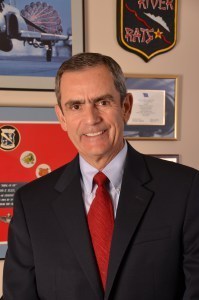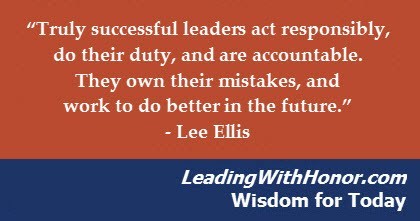Lee Ellis's Blog, page 301
July 22, 2015
New CNN Interview – Immediate Trump, McCain Reaction and a Leadership Principle
New Interview! Watch Lee Ellis’ immediate reaction and response about Donald Trump’s recent comments regarding fellow POW and Senator John McCain. He also shares a critical leadership principle that all leaders must remember in their day-to-day work.
Please watch and share your comments in this forum –


July 20, 2015
Leaders Are Getting the Freedom Package – See What’s Included
We’re so excited about the leaders getting a copy of the ‘Leading with Honor Freedom Package’ this month! Save 30 percent off, and build greater freedom and influence in your personal leadership.
Learn More in Leading with Honor Online Store, and please share!


July 19, 2015
On This Day in Leadership History, July 19, 2015
On this day in leadership history in 1971, the topping out ceremony for Two World Trade Center (South Tower) took place in New York City (the ceremony for One World Trade Center had taken place a few months prior). A symbol is American power and ingenuity, these buildings would later symbolize the risk, loss, and fortitude of the American people.
If you’re a leader that has experienced tremendous risk and loss, find the courage and tenacity to re-build and restore your vision.
World Trade Center – Wikipedia


July 18, 2015
8 Factors to Hire the Best Employees: What Your Management Class Didn’t Teach You
Whether it’s a vendor, contractor, part-time, or full-time employee, Lee Ellis shares the “8 Factors to Hire the Best Employees”. Find out what your management class didn’t teach you.
Click to Download, and please share your comments in this forum –


July 17, 2015
Leading with Honor Wisdom for Today, July 17, 2015
“Truly successful leaders act responsibly, do their duty, and are accountable. They own their mistakes, and work to do better in the future.” – Lee Ellis


July 16, 2015
Leadership FAQ – “What are the top 3 positive ways to act responsibly and be accountable as a leader?”
 A Frequently Asked Question from Lee Ellis –
A Frequently Asked Question from Lee Ellis –
Question:
“What are the top 3 positive ways to act responsibly and be accountable as a leader?”
Answer:
Commitment. Be intentional about doing your duty. It’s the essence of servant leadership, and others are depending on you. Whatever your responsibility, just decide to do it and make it a non-negotiable.
Ownership. Care about what you’re doing. Act as though you were the owner. Someone said that no one washes a rental car before turning it in because they don’t own it.
Courage. Fulfilling your duty isn’t easy. You’ll have to pay the price, take risks, and walk the hard road to do your duty. Temptation will come to cut corners and rationalize your actions to avoid accountability. Courage provides the confidence and energy to keep you focused on your goal of living and leading with honor. Own your mistakes, and work to do better in the future.”
If you like this advice, please share!
Link – Leading with Honor


July 15, 2015
How Natural Behavior Fuels Passion and Creativity in Work
(Editor’s Note: Occasionally, we feature articles* from guest authors that have a special message that we want to share with you. Col. Bill DeMarco is a great colleague and friend that is influencing his sphere of influence with passion and creativity.)
By Bill DeMarco
In his book “Steve Jobs”, Walter Isaacson reflects on a conversation between Jobs and Bob Dylan discussing creativity and composition. Dylan ponders his heyday of song writing saying “that doesn’t happen anymore, I just can’t write them that way anymore…” Then Bob pauses and says to Jobs in his raspy voice and a smirk, “But I still can sing them.”
Even Bob Dylan feels that he “grew up”. I don’t want to grow up and lose that sense of the creative, the passion, and the aspiration.
Creative – and remaining an artist
Sir Ken Robinson has a wonderful story in his TED Talk: “How Schools Kill Creativity” about a little girl who announced to her teacher she was drawing a picture of God. The teacher replied, “But nobody knows what God looks like,” to which the nascent artist responded, “They sure will in a minute.”
She was not afraid that her drawing was incorrect. Being wrong and erring are an organic part of the creative process. Yet schools and other organizations (dare I say the military) condemn mistakes-and want us to just grow up. Thus, by the time children “grow up”, they are mistake averse as well.
Every education system worldwide places math and languages at the top of the stack and ranks the arts at the bottom. In the US, we hear about the need to encourage students to pursue STEM (science, technology, engineering, math) degrees. We do the same thing in the military. There are far more college scholarships available for STEM degrees as opposed to the “arts”. This is because public education originated to meet the needs of industrialization. But times are changing.
What age are we in today? One could argue we are on the verge of yet a third industrial revolution, but in the same breath we hear about the information age or perhaps the post-information age, the conceptual age, or the age of artificial intelligence.
No matter the age, we need creatives, and creatives have enhanced every age from the dawn of time.
There are a myriad of books, articles, and dissertations written on the need to be creative, yet we seem to discourage the pursuit of natural abilities, or even worse, we stigmatize people for demonstrating brilliance in the arts-well unless you are Bob Dylan, and even Bob is having a tough time today and losing his creativity.
Passion – and remaining an artist
The good news is the very “structure of education” is in flux. Thus, as leaders, educators, and mentors, we must “radically rethink” our narrow concept of how we define intelligence. People can think through movement, sight, or sound, because intelligence is indeed truly “diverse”.
Following our passion is the key to finding this diversity.
Some of the greatest leaders throughout history had a passion for the arts and a penchant for creativity. Ponder the leadership and creativity of Henry Ford, Steve Jobs, George Washington, George S. Patton, Dwight D. Eisenhower-all exceptional leaders (with their flaws) and all incredibly creative and very embracive of the art of creativity all while following their passion.
The most powerful leaders are creatives in some way, shape, or form, and they give us perspective on our condition (good or bad) and greater appreciation of our world, ourselves, and our choices. Moreover, they challenge, excite, and motivate.
Aspiration – and remaining an artist
Aspiration is simply the hope or ambition of achieving something. We must mentor, lead, encourage dreams, and assist in the development of a passion to learn. If we cannot connect the student’s desire, passion, creativity, and hope for the future into curriculum, the student simply checks out.
Today’s high school curriculum was developed in the late 1800s in the hope of providing a curriculum that would provide poor students the same education as rich, smart kids. Whatever was taught at prestigious colleges was transferred to high schools-hence we have calculus, algebra, chemistry, biology, etc. in our secondary schools.
Our teens complain about learning chemistry, yet nothing regarding personal finance, nothing about medicine, and nothing about law-all things our young leaders actually need immediately after graduating. Think about it. We learn chemistry, yet we can’t balance a checkbook or understand the rule of law-how does that make sense? It’s about creating an environment where aspiration, or the hope of achieving something can thrive. Aspiration does not look the same to everyone.
Elon Musk has started his own school. The school is Ad Astra, Latin for “to the stars” in southern California. Musk describes a school without the traditional grade structure of American primary education, with the goal of catering to students’ aptitudes, aspirations, and passions not by arbitrary schedules but in real time, and using problem-solving methods to teach critical thinking. Musk, a father of five, says he started the school simply for his own children. The school now has 14 pupils (with a total of 20 scheduled to attend this fall).
Schools – and remaining an artist
Following the Ad Astra model, our schools must allow students to follow and flourish in their passion and aspiration. What gets rewarded is reinforced. Obsession with standardized test scores assaults imagination, the creative, and critical thinking, narrowing curriculum and classroom experience around the lifeless task of filling in bubbles with number two pencil beneath a myriad of multiple-“choice” questions crafted in distant, corporate cubicles. It deadens the minds of our youngsters and forces ultimate conformity at an early age. If we simply push a curriculum developed in the 1800s, reinforced with standardized testing, are we preparing or un-preparing our next generation to compete in our complex and confusing global marketplace?
The answer to the question Picasso poses – how to remain an artist once we grow up? We must encourage creativity and passion, and allow our schools to step into the 21st Century to give our next generation the hope of achieving something – with all these Pablo Picassos out there, imagine what our world could be.
So embrace the creative, the passion, the diversity. Be intentional in encouraging, developing, and remaining artists, and rethink growing up – or at least birthdays.
BD
~~~~
At Leadership Behavior DNA, we believe that the root for sustaining passion and creativity resides in knowing yourself—your unique strengths and struggles, and your natural behavior and talents. Leaders and team members that understand themselves and each other have an exponentially greater opportunity for success in work and business. Download a sample report, and learn more about the leadership development and report services from Leadership Behavior DNA at www.LeadershipBehaviorDNA.com
*Original Article Source: http://www.blogs.jbs.cam.ac.uk/socialinnovation/2015/06/26/embracing-passion-and-creativity/
Author Bio: Joseph William “Bill” DeMarco, US Air Force, was a national security affairs fellow for 2007–2008 at the Hoover Institution. A native of San Carlos, CA, Bill graduated from The Citadel, The Military College of South Carolina, with a bachelor of science in Business Administration/Management. He was commissioned a second lieutenant in 1988. He is a command pilot with more than 2,700 flying hours. Bill has been involved in all aspects of air mobility: a tactical and strategic airlift pilot, qualified in airdrop and special operations, tanker pilot, airbase opening/command and control officer, Air Operations Center Division Chief, and most recently, Commander, 15 Air Mobility Operations Squadron, Travis AFB, CA. He has served in Operations Desert Shield/Storm, Mogadishu, Rwanda, Haiti, Bosnia, Kosovo, Northern/Southern Watch, Nobel Eagle and most recently Enduring and Iraqi Freedom with four tours in theater. Lt. Col. DeMarco holds three masters degrees in Military Arts and Science, American Military University, VA, Military Operational Art and Science, Air University, AL, and Airpower Art and Science from the School of Advanced Air and Space Studies, Maxwell AFB, AL. His research at the Hoover Institution will focus on issues concerning strategic leadership and communication in a war time environment.


July 13, 2015
Special Offer – Leading with Honor Freedom Package – See Inside
 Studying a leadership lesson per week in ‘Leading with Honor’ is the perfect way to build greater freedom and influence in your personal leadership. We’ve created a new ‘Freedom Package’ that includes the Leading with Honor book, training guide, and wristband.
Studying a leadership lesson per week in ‘Leading with Honor’ is the perfect way to build greater freedom and influence in your personal leadership. We’ve created a new ‘Freedom Package’ that includes the Leading with Honor book, training guide, and wristband.
Order during the month of July, and save 30 percent!
Learn More and Order in the Online Store –


July 12, 2015
On This Day in Leadership History, July 12, 2015
On this day in leadership history in 1960, manufacturing began for the Etch A Sketch®. This ingenious toy has helped spark the imaginations of kids and adults alike for generations, and some of today’s leaders were, no doubt, influenced by this creative learning tool.
Was the Etch A Sketch one of your favorite toys? Please share your comments –
Etch a Sketch – Wikipedia


July 11, 2015
Helping the Next Generation Embrace Passion and Creativity – Great Advice
As parents and leaders that have an opportunity to influence young people, how do we teach next generation (and current generation) leaders to keep innovating? It’s what has made America great.
This article from our friend and colleague, Col Bill DeMarco, explores how to instill creativity and passion from those that follow you.
Please Read on the Cambridge University Business School website, and share your comments in this forum –












